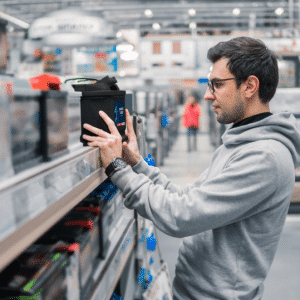Working with a domestic battery manufacturer minimizes supply chain disruptions for automotive aftermarket retailers and battery distributors.
As supply chain constraints have begun to loosen, companies are once more turning to overseas suppliers. But there are many advantages of working with a domestic battery manufacturer of lead-based automotive, truck and SUV batteries.
In our previous blog on domestic battery manufacturing, we looked at market readiness and program support, as well as environmental and safety standards. Now let’s consider three more benefits of a domestic manufacturing partnership.
Value of Vertical Integration
How much control a company has within the manufacturing process can have a significant impact on lead times. Any delay from suppliers has a cascading effect on production. Vertical integration is becoming a key consideration for many customers.
For battery manufacturers, lead and polypropylene are the two key components to manage. The manufacturer can have a reliable source for lead, but if the poly supplier is experiencing shortages, production is negatively impacted. By controlling those primary raw materials, a battery manufacturer minimizes potential disruptions and can more accurately forecast production capacity.
Impact of Inflation and Interest Rates
Cash flow is a typical business concern. The inflation rate has slowly decreased, from an average of 8.0% in 2022 to 4.6% year to date. But all eyes remain on rising interest rates, with additional rate hikes forecasted in the coming months.
For companies that purchase batteries from import manufacturers, there is typically an additional 30 to 60 days from the time the order is placed until receipt. To offset the shipping time, automotive aftermarket retailers and large battery distributors tend to place larger orders. This effectively increases their inventory requirements by having such a lengthy supply chain.
Because of these large orders, these retailers and distributors must face bloated inventories when supply chain improve. The suppliers have been paid, but now the product must be sold. Unfortunately, many are faced with more product than they can sell in a timely manner. This imbalance leads to cash flow issues, along with inventory maintenance costs associated with “boosting” to keep the product fresh.
Due to the extended supply chain timing, the interest these retailers are paying on that inventory is significantly more than they would pay for a domestic battery manufacturing partner. With a North American supply chain, these manufacturers can turn product around typically within 14 to 21 days of purchase. And with higher interest rates due to inflation, retailers would prefer not to carry large quantities of inventory they may not be able to sell. To maintain cash flow, keeping an eye on inventory levels is crucial.
Importance of Domestic Recycling
Sourcing is a key component of manufacturing. A domestic supply chain helps to minimize the environmental impact. Domestic battery manufacturers have a readily available supply of lead, polypropylene and electrolyte, courtesy of a robust recycling program.
Lead batteries have a 99 percent recycling rate, making them the most recycled consumer product in the U.S. Recycling keeps more than 160 million lead batteries out of landfills and results in a stable stream of lead and plastic for future battery manufacturing. U.S. battery manufacturers source about 83 percent of the needed lead from domestic lead battery recycling. As a result, a new lead battery produced in the U.S. is typically comprised of more than 80 percent recycled raw materials.
The plastic casing and the electrolyte in a battery are also recycled. The polypropylene plastic and other casing materials are crushed into small pieces, melted for recycling and molded to make new battery casings. Used battery electrolyte is processed into sodium sulfate, which is used in laundry detergent, glass and textile manufacturing.
The Economic Impact of Domestic Battery Manufacturing
Over 90 percent of domestic lead battery demand is met by North American manufacturing. There is also a tremendous economic impact by partnering with a domestic battery manufacturer. The lead battery industry supports almost 37,500 direct jobs with a total payroll of $3 billion. Companies in the lead battery industry have also contributed $2.96 billion in government revenue via local, state and federal taxes.
The industry has also invested over $112.8 million in research and development to meet the evolving demands of the wide variety of sectors served by lead batteries. Many innovations have improved the lifespan of batteries and their ability to store energy. In addition to product improvements, manufacturers and recyclers are also working to make their processes more efficient.
Working with a domestic battery manufacturer with a vertically integrated domestic supply chain minimizes disruptions and allows automotive aftermarket retailers and battery distributors to set inventory requirements more accurately and reduce safety stock.
Bill Nonnamaker, Vice President of Sales, Transportation







